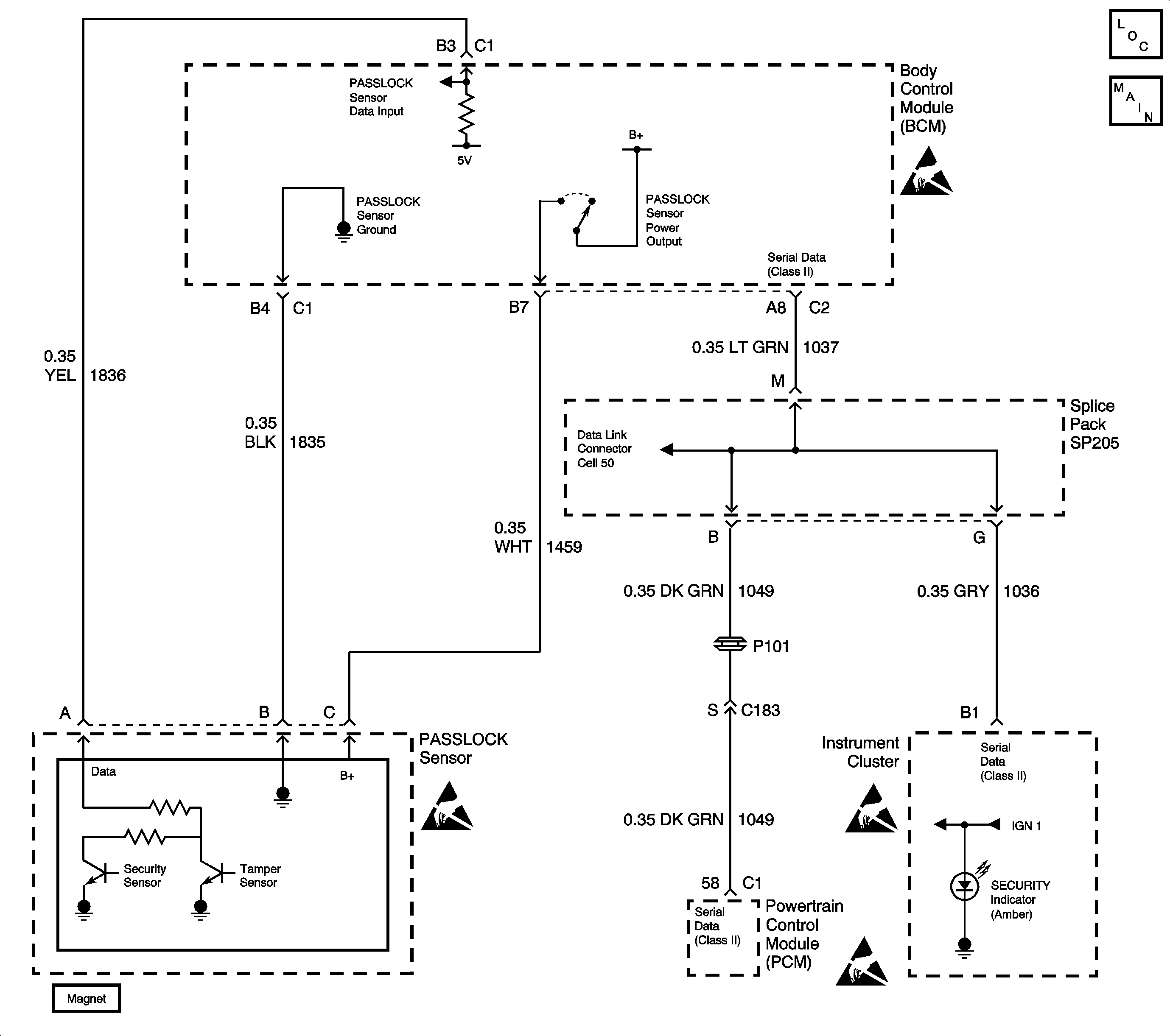
Circuit Description
The Passlock™ theft deterrent system contains a Passlock™ sensor. The Passlock™ sensor is part of the ignition lock cylinder assembly. The body control module (BCM) provides voltage (B+) to the Passlock™ sensor through circuit 1459 when the ignition switch is in the accessory, on, or start. The BCM also provides ground to the Passlock™ sensor through circuit 1835. The Passlock™ sensor interfaces with the BCM through the Passlock™ detection circuit 1836.
When turning the ignition switch to the start position with the proper key, the Passlock™ sensor generates an analog voltage signal. This signal is sent through the Passlock™ detecting circuit. This analog voltage signal is of a specific value to the vehicle, and varies from vehicle to vehicle. When attempting to start the engine, the BCM compares a preset stored analog voltage value with the signal coming from the sensor. Because both values match, the BCM sends a fuel enable password via the Class 2 serial data link to the powertrain control module (PCM). As a result, the PCM enables the crank relay, and allows fuel delivery to the engine.
When attempting to start the engine by means other than using the proper key in the ignition switch, the Passlock™ sensor sends an analog voltage signal of a different value. The BCM compares the preset stored analog voltage value with the signal coming from the sensor. Because both values do not match, the BCM sends a fuel disable password via the Class 2 serial data link to the powertrain control module (PCM). As a result, the PCM disables the crank relay, and does not allow fuel delivery to the engine.
Conditions for Setting the DTC
The BCM detects a short to B+ in circuit 1459 for one second with the ignition switch off and the BCM in wake-up state. Refer to Body Control System Operation for more information regarding BCM wake-up/sleep state.
Action Taken When the DTC Sets
| • | The BCM stores DTC B2948 in memory. |
| • | The BCM does NOT send a message to the instrument cluster, thus the SECURITY indicator stays OFF. |
| • | A history DTC will clear after 100 consecutive ignition cycles if the condition for the malfunction is no longer present. |
| • | Using a scan tool. |
Conditions for Clearing the DTC
| • | A current DTC B2948 clears when the BCM no longer detects a short to B+ in circuit 1459 with the ignition switch off and the BCM is in wake-up state. |
| • | Even when a short to B+ is present in circuit 1459, turning the ignition switch from off to accessory will clear this DTC as a current DTC. This DTC will reset as a current DTC when the ignition switch is off with the BCM in the wake-up state. |
Diagnostic Aids
| • | Check for a short to B+ in circuit 1459 with the ignition switch off. Reason why is that the BCM checks for this DTC when the ignition switch is in the off position only. |
| • | If the DTC is a history DTC, the problem may be intermittent. Try performing the tests shown while moving wiring, connectors, and the key, this can often cause the malfunction to appear. |
Test Description
The numbers below refer to the step numbers on the diagnostic table.
-
Checks for a short to B+ in circuit 1459.
-
Checks for a faulty Passlock™ sensor.
-
Checks for a faulty BCM.
Step | Action | Value(s) | Yes | No |
|---|---|---|---|---|
1 | Did you perform the Theft Deterrent Diagnostic System Check? | -- | ||
Is the voltage measured less than the specified value? | 2 V | |||
Is the voltage measured less than the specified value? | 2 V | |||
Does BCM DTC B2948 reset as a current DTC? | -- | |||
5 | Repair short to B+ in circuit 1459. Is the repair complete? | -- | -- | |
6 |
Is the repair complete? | -- | -- | |
7 |
Is the repair complete? | -- | -- | |
8 | Malfunction is intermittent or not present at this time. Refer to Diagnostic Aids for more information. Is the action complete? | -- | -- | |
9 |
Are there any current BCM DTCs present? | -- | System OK |
